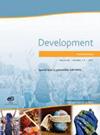发现实地发展的多样性。
IF 3.7
2区 生物学
Q1 DEVELOPMENTAL BIOLOGY
引用次数: 0
摘要
许多发育生物学家很少离开实验室进行研究,而是依赖于建立传统和新兴的模式系统群。然而,要充分了解发育和进化的机制和原理,包括生态和环境的作用,就必须结合背景研究各种生物。在本《视角》中,我们将聆听来自世界各地的五个研究团队讲述深入实地研究他们感兴趣的生物的重要性和挑战。我们还邀请您在 "节点 "上分享自己的野外工作故事。本文章由计算机程序翻译,如有差异,请以英文原文为准。
Uncovering developmental diversity in the field.
Many developmental biologists seldom leave the lab for research, relying instead on establishing colonies of traditional and emerging model systems. However, to fully understand the mechanisms and principles of development and evolution, including the role of ecology and the environment, it is important to study a diverse range of organisms in context. In this Perspective, we hear from five research teams from around the world about the importance and challenges of going into the field to study their organisms of interest. We also invite you to share your own fieldwork stories on the Node.
求助全文
通过发布文献求助,成功后即可免费获取论文全文。
去求助
来源期刊

Development
生物-发育生物学
CiteScore
6.70
自引率
4.30%
发文量
433
审稿时长
3 months
期刊介绍:
Development’s scope covers all aspects of plant and animal development, including stem cell biology and regeneration. The single most important criterion for acceptance in Development is scientific excellence. Research papers (articles and reports) should therefore pose and test a significant hypothesis or address a significant question, and should provide novel perspectives that advance our understanding of development. We also encourage submission of papers that use computational methods or mathematical models to obtain significant new insights into developmental biology topics. Manuscripts that are descriptive in nature will be considered only when they lay important groundwork for a field and/or provide novel resources for understanding developmental processes of broad interest to the community.
Development includes a Techniques and Resources section for the publication of new methods, datasets, and other types of resources. Papers describing new techniques should include a proof-of-principle demonstration that the technique is valuable to the developmental biology community; they need not include in-depth follow-up analysis. The technique must be described in sufficient detail to be easily replicated by other investigators. Development will also consider protocol-type papers of exceptional interest to the community. We welcome submission of Resource papers, for example those reporting new databases, systems-level datasets, or genetic resources of major value to the developmental biology community. For all papers, the data or resource described must be made available to the community with minimal restrictions upon publication.
To aid navigability, Development has dedicated sections of the journal to stem cells & regeneration and to human development. The criteria for acceptance into these sections is identical to those outlined above. Authors and editors are encouraged to nominate appropriate manuscripts for inclusion in one of these sections.
 求助内容:
求助内容: 应助结果提醒方式:
应助结果提醒方式:


